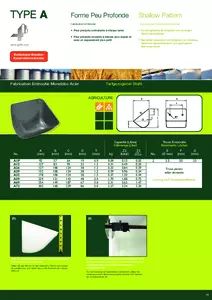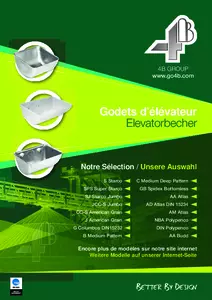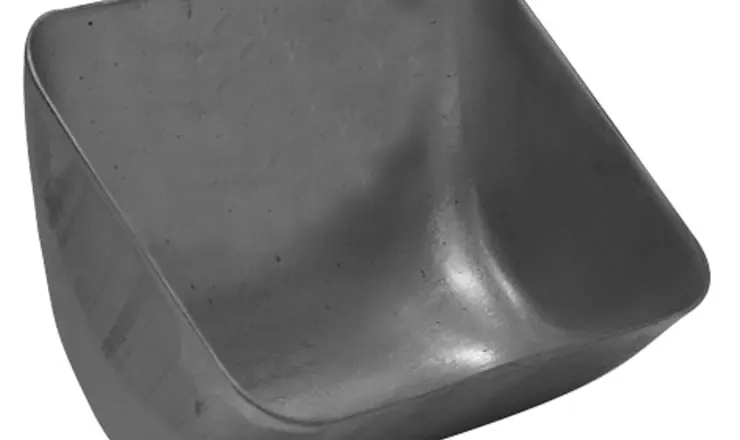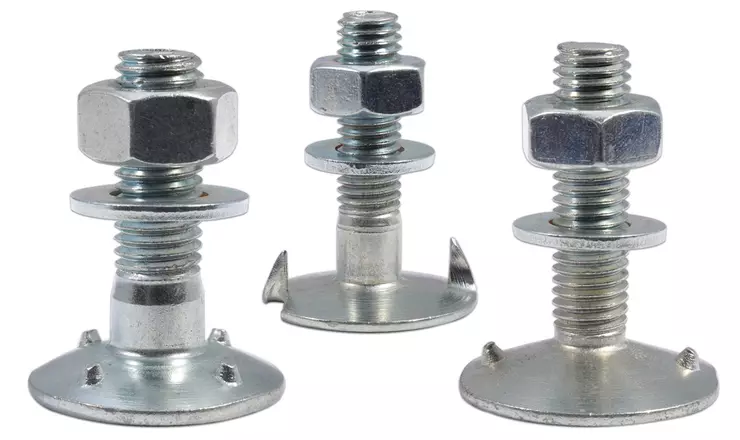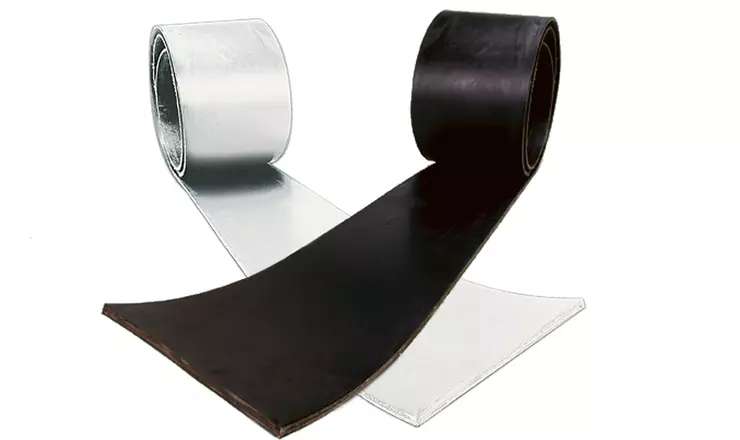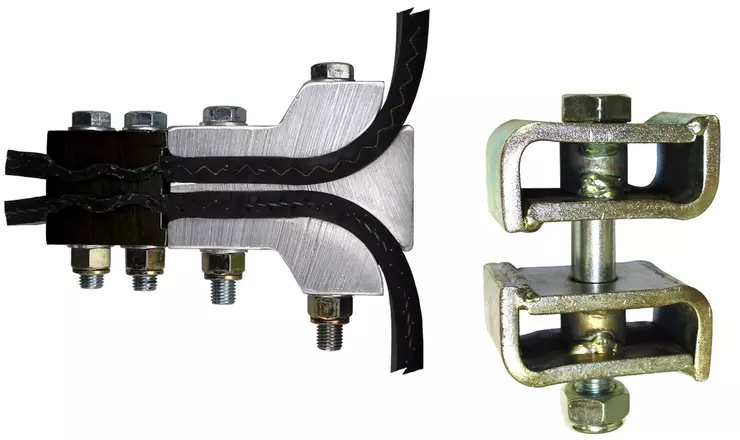Utilisé pour les produits collants ou à vitesse plus rapide et avec un espacement plus petit.
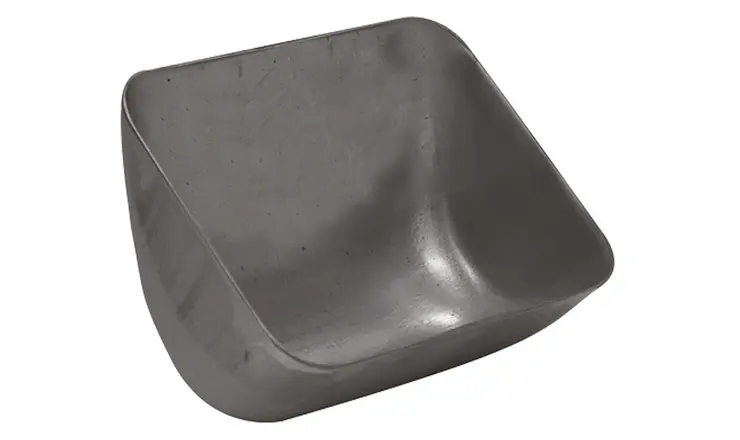
- Godet de fabrication emboutie
- Pour produits colmatants à vitesse lente
- Pour produits coulants à vitesse plus rapide et avec un espacement plus petit
Specifications

| A-TYPE | A | B | C | D | T | Weight | Capacity | Capacity | Holes | E | F | G |
| bucket | (mm) | (mm) | (mm) | (mm) | (mm) | (kg) | Z2 (total) | Z3 (water) | No. | (dia mm) | (mm) | (mm) |
| A29 | 152 | 108 | 124 | 38 | 1.2 | 0.39 | 0.96 | 0.34 | to customer spec | |||
| A32 | 178 | 108 | 124 | 38 | 1.5 | 0.57 | 1.2 | 0.44 | to customer spec | |||
| A59 | 229 | 121 | 143 | 48 | 3 | 1.7 | 1.88 | 0.75 | to customer spec | |||
| A69 | 254 | 149 | 187 | 67 | 3 | 2.31 | 3.65 | 1.47 | to customer spec | |||
| A72 | 305 | 168 | 229 | 86 | 3 | 3.27 | 3.24 | 2.5 | to customer spec |
Trous percés selon demande.
Downloads
FAQ's
FAQ - Elevator Buckets
What is a HIGH EFFICIENCY elevator bucket?
HIGH EFFICIENCY elevator buckets incorporate all five of the following characteristics: a smooth interior front face with no "breaks", wing-less side walls, close vertical placement on the elevator belt, a tapered bottom and the ability to nest for shipping and storage. For more details, CLICK HERE
Why use Low Profile elevator buckets?
Low profile elevator buckets are created to achieve the closest vertical spacing possible on the elevator belt, thereby optimizing the system for the greatest potential capacity. Some styles of elevator bucket require modification and others are low profile by standard design. Wet or sluggish inputs do not generally load and discharge well in low profile buckets. Due to the extra capacity that is generated and the weight of the additional buckets and material, belt PIW rating, pulley shaft diameters and motor HP may have to be upgraded. Check with 4B engineering department about the best way to get the most capacity out of your elevator leg.
Why add vent holes to the bottom of an elevator bucket?
When elevating fluffy or powdery materials, vent holes in the bottom of the elevator bucket allow it to fill and discharge more efficiently. As material enters the bucket, it encounters a pillow of air resting in the bottom. Vent holes provide an escape path for this pillow of air, so that the entering material does not bounce out of the bucket and back down the elevator leg casing. Upon discharge, the vent holes allow air to re-enter the bucket at the material exits, releasing any vacuum that might hold it the bucket too long, creating down legging.
Are CC style elevator buckets interchangeable with Starco elevator buckets?
Starco elevator buckets have a special shallow geometry and are intended to be placed extremely close together on the elevator belt. Therefore, you should check with the 4B engineering department before replacing Starco elevator buckets with any other brand or design.
How long of an elevator bolt do I need?
When installing buckets on an elevator belt, use this simple formula:
(belt thickness + bucket back thickness + washer thickness + nut thickness + 1/4 inch)
What is a "digger" bucket?
Some materials can form a hardened crust along the side wall of the elevator boot, and powders sitting over time can become rock hard. Both of these issues can cause premature elevator bucket wear. Digger buckets are designed to have slightly more width and projection than standard buckets, thereby "digging" through or breaking apart the hardened material, helping to prevent added wear to the standard buckets. Digger buckets are traditionally made from steel, however nylon buckets may also be used depending on the application.
How many digger buckets do I need?
For most applications, use one digger bucket for every nine standard buckets.
Can I use buckets on an overlap splice?
An overlap splice doubles the thickness of the belt, so a bucket's projection will increase on the overlap. Usually this will not cause a problem, but if it does, you can use buckets with one inch less projection or cut the tip of each bucket by half an inch on the spliced area.
When using an overlap splice, how much extra belt should I use for the splice?
The length of the splice should be three times the width of the belt.
How often should I replace head pulley lagging?
Lagging should be replaced every time the elevator belt is replaced.
Design Services
Service Design pour Elévateurs à Godets
Service Design pour Elévateurs à Godets
A 4B, nous avons conçu des centaines d'élévateurs a godets, pour toutes les applications, y inclus l'alimentation animale, céréales, ciment, sable, charbon et autres.
Profitez de notre service de design gratuit. Qu'il s'agit d'un élévateur nouveau ou existant, notre equipe d'ingénieurs peut vous donner une recommandation technique détaillée, avec une capacité et des caractéristiques de décharges optimales.
Pour recevoir une calculation gratuite
remplissez le formulaire ci-dessous. -Tous les champs doivent être renseignées. .
A 4B, nous avons conçu des centaines d'élévateurs a godets, pour toutes les applications, y inclus l'alimentation animale, céréales, ciment, sable, charbon et autres.
Profitez de notre service de design gratuit. Qu'il s'agit d'un élévateur nouveau ou existant, notre equipe d'ingénieurs peut vous donner une recommandation technique détaillée, avec une capacité et des caractéristiques de décharges optimales.
Pour recevoir une calculation gratuite
remplissez le formulaire ci-dessous. -Tous les champs doivent être renseignées. .

